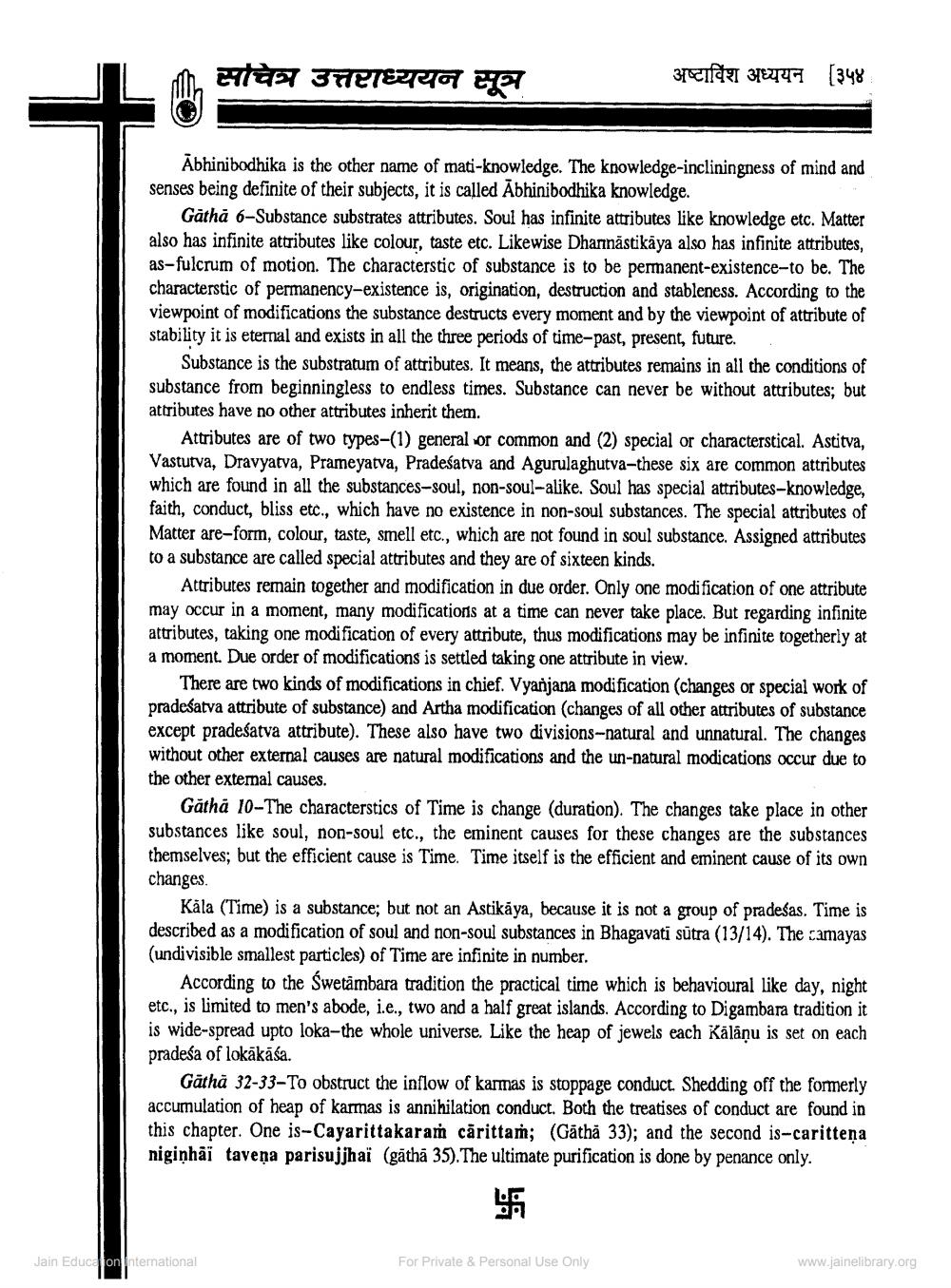________________
ain सचित्र उत्तराध्ययन सूत्र
अष्टाविंश अध्ययन [३५४
Abhinibodhika is the other name of mati-knowledge. The knowledge-incliningness of mind and senses being definite of their subjects, it is called Abhinibodhika knowledge.
Gathā 6-Substance substrates attributes. Soul has infinite attributes like knowledge etc. Matter also has infinite attributes like colour, taste etc. Likewise Dhannāstikaya also has infinite attributes, as-fulcrum of motion. The characterstic of substance is to be permanent-existence-to be. The characterstic of permanency-existence is, origination, destruction and stableness. According to the viewpoint of modifications the substance destructs every moment and by the viewpoint of attribute of stability it is eternal and exists in all the three periods of time-past, present, future.
Substance is the substratum of attributes. It means, the attributes remains in all the conditions of substance from beginningless to endless times. Substance can never be without attributes; but attributes have no other attributes inherit them.
Attributes are of two types-(1) general or common and (2) special or characterstical. Astitva, Vastutva, Dravyatva, Prameyatva, Pradeśatva and Agurulaghutva-these six are common attributes which are found in all the substances-soul, non-soul-alike. Soul has special attributes-knowledge, faith, conduct, bliss etc., which have no existence in non-soul substances. The special attributes of Matter are-form, colour, taste, smell etc., which are not found in soul substance. Assigned attributes to a substance are called special attributes and they are of sixteen kinds.
Attributes remain together and modification in due order. Only one modification of one attribute may occur in a moment, many modifications at a time can never take place. But regarding infinite attributes, taking one modification of every attribute, thus modifications may be infinite togetherly at a moment. Due order of modifications is settled taking one attribute in view.
There are two kinds of modifications in chief. Vyanjana modification (changes or special work of pradeśatva attribute of substance) and Artha modification (changes of all other attributes of substance except pradeśatva attribute). These also have two divisions-natural and unnatural. The changes without other external causes are natural modifications and the un-natural modications occur due to the other external causes.
Gåthå 10-The characterstics of Time is change (duration). The changes take place in other substances like soul, non-soul etc., the eminent causes for these changes are the substances themselves; but the efficient cause is Time. Time itself is the efficient and eminent cause of its own changes.
Kala (Time) is a substance; but not an Astikāya, because it is not a group of pradeśas. Time is described as a modification of soul and non-soul substances in Bhagavati sutra (13/14). The camayas (undivisible smallest particles) of Time are infinite in number.
According to the Swetambara tradition the practical time which is behavioural like day, night etc., is limited to men's abode, i.e., two and a half great islands. According to Digambara tradition it is wide-spread upto loka-the whole universe. Like the heap of jewels each Kälāņu is set on each pradeśa of lokākāśa.
Gatha 32-33-To obstruct the inflow of karmas is stoppage conduct. Shedding off the formerly accumulation of heap of karmas is annihilation conduct. Both the treatises of conduct are found in this chapter. One is-Cayarittakaram cărittam; (Gātha 33); and the second is-caritteņa niginhâï tavena parisujjhai (gātha 35). The ultimate purification is done by penance only.
LA
Jain Educ
on International
For Private & Personal Use Only
www.jainelibrary.org




